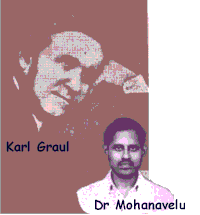|
|
|||
A young Indian pursues a chance discovery to its end, |
|||
|
The few paragraphs which young Mohanavelu, 21 years of age, came across in 1967 were to change the course of his life and lead him on to an exciting journey of discovery. The book? "India and the Germans" by Walter Leifer! Dr. C.S. Mohanavelu read it as a student learning German in Max Muller Bhavan. It referred to German missionaries coming to Tamil Nadu in the 18th century and they being asked to send back home, reports on what they saw around them. This tiny reference to material having been sent back to Germany over 250 years ago by the missionaries, sowed the seeds of curiosity in the young man's mind and lingered there for about 20 years. When he finally registered himself for a part-time PhD in Madras University, he began to pursue the trail. He was a young man of modest means. Dedication to scholarship meant courting hardship for a companion, but the fire had been lit in him and would not be put out! The paper trail The initial research days were not very favourable for Mohanavelu who found his efforts being thwarted by lack of information, but he did not lose heart and went on with his work based on the strength of his deductive reasoning and of course his gut feeling. The true break came when he traveled to Germany under a DAAD scholarship and managed to get access to the Franckens archives in Halle. "These archives in Halle store more than 2 lakh valuable documents, which are accounts by German missionaries on the social, economic and other customs in Tamil Nadu, sent back to Germany over 300 years" says Dr. C.S. Mohananvelu. He recalls finding sackfuls of Tamil palm-leaves during this visit in 1986 to Halle , which was made to research his PhD thesis. His doctoral thesis "German contribution to Tamil Studies" has been published as a book: "German Tamilology", by the Indian Council of Historical Research . Currently, the academician has taken on himself the mammoth task of compiling all German writings in Tamil over 300 years. A Tamil lectures the King of Norway . We owe Dr Mohanavelu the credit for discovering the fascinating story of Peter Malleiappen. But the story must begin with Ziegenbalg [1682 - 1719], the first German missionary to set foot in India. The German missionaries who came to Tamil Nadu in the 18th century, believing the Tamils to be barbarians found to their great surprise that this was not so and on the contrary, it was just the opposite. Thus, the message sent back home to the king was " Tamilians are not barbarians and Tamil is a rich and ancient language..". Zeigenbalg who was the sender of this message was criticized for taking this position. To prove his point, he took with him to Europe, the young Tamil, Peter Malleiappen. On July 26, 1715 Malleiappen was given an audience by King Frederick IV of Norway, and the patron of Ziegenbalg. Malleiappen gave a resounding lecture in fluent German, and convinced the king of the breadth of Tamil culture. This remarkable young man must surely be the first Indian in northern Europe, if not in all of it! Of course, Dr Mohanavelu's work amounts to more than unearthing such interesting vignette of Tamil-German connection. He records German Tamilology in all its fine detail. There is Karl Graul [1814 - 1864], the missionary from Leipzig, who travelled the overland route to Bombay over four years, through Palestine, Egypt, and Sinai! Dr Mohanavelu considers him the finest German Tamilologist. But for a relentless Mohanavelu these pieces of history might have never been known and one might have never guessed that German Indology was indeed rooted in 'Tamilology'. Dr.Mohanavelu lives in the quiet suburb of Tambaram near Chennai. He continues his research into Indo-German interactions, and is willing to respond to any serious queries.
Priti Narasimhan, May,2000
|
|
||

